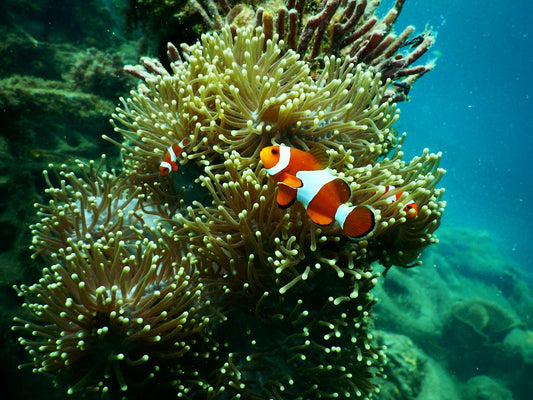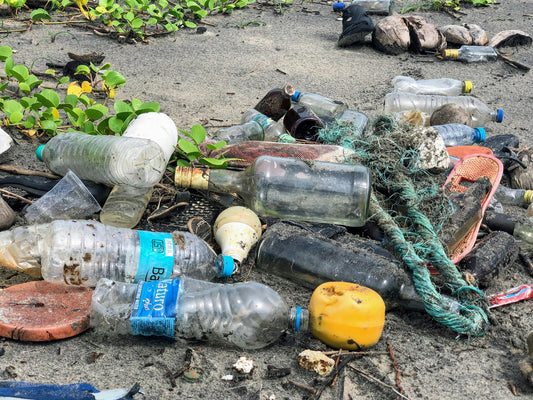Share
There a big chance you're being greenwashed every day
Have you ever wondered if your 'eco-friendly' purchases are really making a positive impact?
In a world filled with green labels and sustainability buzzwords, it's hard to see through the false claims that many companies make to lure in eco-conscious customers.
There is a good chance that businesses fool you into buying products on a regular basis.
In this article, we will uncover the tactics behind those eco-friendly claims and explore how you can see through Greenwashing to make truly impactful choices.
You'll be amazed how audacious some companies get to make even more money.
But what is Greenwashing in the first place?
What is Greenwashing?
The term "Greenwashing" has been around for quite some time, but it's become more prevalent in recent years, as more companies try to capitalize on the growing demand for eco-friendly products.
The important distinction here is Greenwashing vs. Green Marketing in general.
Many companies that legitimately care about the environment advertise the eco-friendliness of their products to appeal to their target group.
As long as these claims are not exaggerated or false, there is nothing wrong with advertising products.
Companies that practice Greenwashing on the other hand exaggerate or misrepresent efforts to be more sustainable to appeal to an eco-conscious audience, without doing the legwork of changing their products or services for the better.
A 2022 poll with 1491 global executives found that 58% of leaders globally and 68% of US leaders admitted to having overstated their companies’ sustainability or greenwashed at times.
With our planet desperately needing true action for more sustainability, Greenwashing is a real problem.
Why is Greenwashing a Problem?

Greenwashing has disastrous effects on the environment and on society as a whole.
By using misleading or false environmental claims, more and more businesses are fooling consumers into making seemingly sustainable purchase decisions.
Consumers who are genuinely interested in making a positive impact end up buying products that harm the environment.
This destroys consumer trust in the future and rips off consumers who want to make a difference.
Additionally, Greenwashing can mask the true effort required for positive change. Environmental change requires a lot of effort and Greenwashing has shown to mask this fact by creating a sense of complacency among consumers.
By marketing products as environmentally friendly, consumers could be encouraged to ignore the true change that is needed to make a true impact and simply count on the environmental claims of seemingly sustainable products.
Finally, Greenwashing can also undermine legitimate environmental efforts by companies that try to change for the better.
By eroding trust in environmental claims, it is more difficult for consumers to distinguish between genuinely environmentally responsible products and those that are merely Greenwashing.
This does not only make it harder for companies that are genuinely committed to sustainability to stand out and gain recognition for their efforts.
It also dilutes the market for eco-conscious products and businesses that really invest in environmentally friendly products are financially disadvantaged.
Greenwashing Can Take Many Forms
Greenwashing can take many forms, from using vague or meaningless terms like "natural" or "eco-friendly" to even making bold and untrue statements about saving the planet. Here are the most common tactics you'll find.
1. Empty And Irrelevant Claims
A popular tactic is advocating for positive change, without giving any proof about a the actual sustainability of a product or service.
You will often see companies using vague language like "sustainable" or "good for the environment", without clear indication why that is the case.
Knowing that Innocent is owned by Coca Cola, many times crowned the world’s worst plastic polluter, and knowing that Innocent produces 32,000 plastic bottles per hour, lets you think twice about the validity of these claims.
Luckily, The Plastics Rebellion campaigned against the advertisement and a few weeks after airing it got banned by the Advertising Standards Authority (ASA) for making misleading statements.
Another example of empty or irrelevant claims is if companies use official regulations to shine a sustainable light on them.
With every official ban or regulation, you will find companies acting like it was their idea.
For instance Starbucks announcing its plans to ban plastic straws amidst regulations that force them to do so, does not really mean that the company cares about the environment. It only means they have to adhere to global regulations to avoid financial penalties.
You will even find producers that still advertise their product as CFC-free. CFCs are ozone-harming chemicals that were banned from nearly all consumer products in the 1980s.
The "No CFCs" label still can be found on many products. It is a label that is sponsored by 3M and a labeled product can still contain many chemicals that harm the ozone layer.
2. Fake Green Packaging And Labels
Another common tactic is to use fake eco-friendly packaging to create the impression of sustainability, without actually making any significant changes to the product or production process.

This is often paired with shady labels or certifications that are targeted to lure you into buying a supposedly eco-friendly product.
One of the most common examples of this tactic is using recycling symbols. If you thought the symbols below indicate a package is recyclable, you've been greenwashed!

The "green dot" on the left only indicates that a company is investing in recycling efforts by paying a license fee to the Green Dot Trademark, which is in no way related to the actual packaging that shows the symbol.
While it is great to invest in the enhancement of recycling efforts, the symbol has a great chance of misleading consumers.
The famous symbol with the chasing arrows to the right only indicates the type of plastic and does not necessarily mean something is recyclable. In fact the code that shows a 6 stands for Polystyrene, which is hardly ever recycled.
Another example of green packaging is if businesses quite literally use the color green to signal sustainability.
If you see a product in lush green packaging, be wary and check the product! You might be misled by a clever marketer.
3. Diversion
Diversion is a Greenwashing tactic where a company focuses on a small aspect of their product or service that is environmentally friendly while ignoring the larger environmental impact of their operations.
This tactic is often used by companies to divert attention away from the negative environmental impact of their overall operations.
For example, a skincare company may promote the use of "natural ingredients" in their products while ignoring the larger environmental impact of their operations or their plastic packaging.
This is a form of diversion, where the company focuses on a small aspect of their product that is environmentally friendly while ignoring the larger picture.
While using environmentally friendly materials or practices in one aspect of a company's operations is certainly a positive step, it is important to consider the larger picture.
A company that uses diversion tactics may be trying to distract consumers from the negative environmental impact of their overall operations.
In January 2021, Oatly showed a prime example of how to divert customers!
In a commercial, the company stated that "Oatly generates 73% less CO2e vs. milk, calculated from grower to grocer".
The ASA banned the ad shortly after, stating that Oatly failed to provide evidence for its claims and ignored the full impact of its supply chain.
Rather than accounting for the full lifecycle of the product, the calculations ignored negative impact of production, harvest and other potentially harmful impacts on the environment.
This is the reason, why at SWOP, we only rely on suppliers in North America and Western Europe. If you ordered a zero waste kitchen brush and your package is shipped from Asia, you'd have to wonder if the saved plastic really makes up for this immense carbon footprint.

4. Sponsorship

We find that sponsorship deserves its own category for Greenwashing, as it is one of the most influential ones.
Sponsoring events can be a form of Greenwashing if a company uses the sponsorship to promote itself as environmentally responsible while ignoring its own negative environmental impact.
This is particularly problematic when big polluters sponsor events related to environmental issues, such as the United Nations Conference of the Parties (COP) on climate change.
Some of the world's worst polluters like Coca-Cola, PepsiCo, and big oil companies, have been criticized for sponsoring COP events.
While the companies may be supporting the event financially, their sponsorship can be seen as an attempt to distract attention from their own negative environmental impact, including the production and disposal of single-use plastic bottles.
Sponsoring events like COP can also create conflicts of interest. For example at COP27, which was largely criticized for sponsorship by Coca Cola.
The representatives participated in talks and workshops, despite the fact that the company has been contributing to deforestation and land-use change, and is the undisputed winner of the "world's worst plastic polluter" award for the fifth consecutive year.
The big oil companies could also be seen lobbying during the event and one can only assume that they were trying to influence the regulations that are so crucial to saving our environment.
If you think the COP learned from its mistakes, you're sadly wrong
COP28 in November 2023 has fueled (pun intended) a huge outrage, as it is chaired by Sultan Al Jaber, head of the Abu Dhabi National Oil Company.
Sponsoring events like COP is a way for companies to influence policy discussions and shape the narrative around environmental issues in their favor.
This Greenwashing tactic can result in shifting the focus on individual consumer choices, such as recycling, rather than the systemic change that is needed to address the root causes of environmental problems.
Sustainability Requires Commitment
So, how can you avoid falling for Greenwashing?
As consumers, we need to be aware of the tactics that are used around us, to avoid falling for illegitimate claims.
By educating yourself, you are already taking a first step to avoid Greenwashing.
Luckily, there are a number third-party certifications or labels that indicate a product has met legitimate environmental standards.
As an example, the Forest Stewardship Council (FSC) certification indicates that wood products come from responsibly managed forests and avoid deforestation.
Personal research of product reviews or articles about a company's sustainability practices can be another helpful method. By, researching the company's overall environmental impact and its public image, you can already determine how sustainable claims fit into the broader picture.
Try to consider companies that have a comprehensive sustainability strategy in place before those that suddenly claim a green niche for themselves without a history about caring for the environment.
It's also important to be skeptical of any product that seems too good to be true. If you read claims like "100% natural" it might be worth to dig deeper to see if you find proper proof for those statements.
Greenwashing is a true problem and it is crucial that consumers are aware of the issue. By spotting the signs and making conscious purchasing decisions, you can avoid being fooled by misleading marketing tactics.
Remember, true sustainability goes beyond just using green packaging or buzzwords. It requires a genuine commitment to reducing our impact on the environment by both consumers and businesses.
We hope you enjoyed this article. If you want to read more like this, make sure to check out our Blog and follow us on Instagram. If you are interested in truly sustainable products, check out our Shop. At SWOP, we live transparency. If you have any questions about our products, never hesitate to reach out.








